#The Journals of André Gide
Text

André Gide (French 1869-1951). The Journals of André Gide, Volume III, 1928-1939. [New York : A.A. Knopf. 1949]
#quote#quotation#quote from André Gide#André Gide#The Journals of André Gide#askew#philosophy of life#philosophy of living#way to live
1 note
·
View note
Text
The journals of André Gide
When I first read them, I was drawn to his lines about reading, writing, and translating Hamlet, among others. Now—“Lassitude and computation of death.”




"The cat venturing out on the branch without trembling is less aware of the void beneath him than of the nestful of little birds he is after."
"And if the fire burns us, we shall not put it out merely for that reason."
“When too eager to watch oneself live, one ceases to live. The scrutiny, in this case, creates what it seeks and you become what you convince yourself that you are.”
"Free at last and with no tie left, like a kite with the string suddenly cut, I toppled over, diving soul-first toward the ground, where I crashed."
"A snake lies hidden in the grass." (Virgil)

“The day before yesterday, relapse. One seems to fall as low as ever and all the effort of these days seems lost. Hell would consist in continuing to sin, despite oneself, without deriving any pleasure from doing so.”
Reminds me of what Cioran said when asked whether one gains intensity in old age: “One doesn't become better on the moral plane with old age. Or wiser. Contrary to what people think. One gains nothing in getting old. But as one is more tired, one gives the impression of wisdom.”
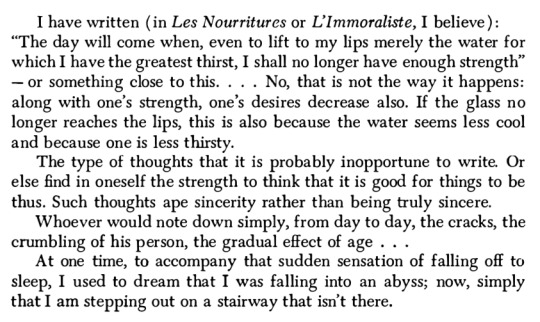
"To the finest sunrises I say: "Oh, let me sleep!" The world still has its charm, but those rights over everything that I used to grant myself I am less inclined to recognize now that I know those with whom I share them to be so few." (Journal, 18 August 1934)
"The abominable effort to take one’s sins with one to paradise..."
10 notes
·
View notes
Text
Cette blessure qu'il ne faut pas laisser se cicatriser, mais qui doit demeurer toujours douloureuse et saignante, cette blessure au contact de l'affreuse réalité.
André Gide - Journal
28 notes
·
View notes
Text
THIS DAY IN GAY HISTORY
based on: The White Crane Institute's 'Gay Wisdom', Gay Birthdays, Gay For Today, Famous GLBT, glbt-Gay Encylopedia, Today in Gay History, Wikipedia, and more … November 22


1869 – André Gide (d.1951) was a French author and winner of the Nobel Prize in literature in 1947. Gide's career ranged from its beginnings in the symbolist movement, to the advent of anticolonialism between the two World Wars.
Known for his fiction as well as his autobiographical works, Gide exposes to public view the conflict and eventual reconciliation between the two sides of his personality, split apart by a straight-laced education and a narrow social moralism.
Gide was born in Paris on 22 November 1869, into a middle-class Protestant family. His father was a Paris University professor of law and died in 1880.
Gide was brought up in isolated conditions in Normandy and became a prolific writer at an early age, publishing his first novel, The Notebooks of Andre Walter (French: Les Cahiers d'André Walter), in 1891.
In 1893 and 1894, Gide traveled in Northern Africa, and it was there that he came to accept his attraction to boys. He befriended Oscar Wilde in Paris, and in 1895 Gide and Wilde met in Algiers. There, Wilde had the impression that he had introduced Gide to homosexuality, but, in fact, Gide had already discovered this on his own.
In 1895, after his mother's death, he married his cousin Madeleine Rondeaux, but the marriage remained unconsummated.
In 1908, Gide helped found the literary magazine Nouvelle Revue Française (The New French Review).
In 1916, Marc Allégret, only 15 years old, became his lover. Marc was the son of Elie Allégret, best man at Gide's wedding. Of Allégret's five children, André Gide adopted Marc. The two fled to London, in retribution for which his wife burned all his correspondence, "the best part of myself," as he was later to comment.
In the 1920s, Gide became an inspiration for writers such as Albert Camus and Jean-Paul Sartre. In 1923, he published a book on Fyodor Dostoyevsky; however, when he defended pederasty in the public edition of Corydon (1924) he received widespread condemnation. He later considered this his most important work.
In 1923, he sired a daughter, Catherine, by Elisabeth van Rysselberghe, a woman who was much younger than him. He had known Elisabeth for a long time, as she was the daughter of his closest female friend, Maria Monnom, the wife of his friend, the Belgian neo-impressionist painter Théo van Rysselberghe. This would cause the only crisis in the long-standing relationship between Allégret and Gide and damaged the relation with Van Rysselberghe. This was possibly his only sexual liaison with a woman and it was brief in the extreme, but his daughter Catherine became his only descendant by blood. He liked to call Elisabeth "La Dame Blanche" ("The White Lady"). Elisabeth eventually left her husband to move to Paris and manage the practical aspects of Gide's life (they had adjoining apartments built for each of them on the rue Vavin). She worshipped him, but evidently they no longer had a sexual relationship. Gide's legal wife, Madeleine, died in 1938. Later he used the background of his unconsummated marriage in his novel Et Nunc Manet in Te.
From July 1926 to May 1927, he travelled through the French Equatorial Africa colony with his lover Marc Allégret. In his published journal, he criticized the behavior of French business interests in the Congo and inspired reform. In particular, he strongly criticized the Large Concessions regime, according to which part of the colony was conceded to French companies which could exploit all of the area's natural resources, in particular rubber. He related how natives were forced to leave their village during several weeks to collect rubber in the forest, and went as far as comparing their exploitation to slavery. The book had important influence on anti-colonialism movements in France and helped re-evaluate the impact of colonialism.
Gide left France for Africa in 1942 and lived in Tunis until the end of World War II. In 1947, he received the Nobel Prize in Literature. He devoted much of his last years to publishing his Journal. Gide died in Paris on 19 February 1951. The Roman Catholic Church placed his works on the Index of Forbidden Books in 1952.

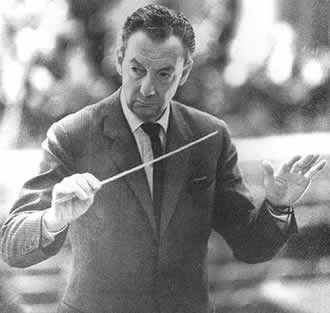
1913 – Benjamin Britten, Baron Britten, (d.1976) was an English composer, conductor, and pianist. He showed talent from an early age, and first came to public attention with the a cappella choral work A Boy Was Born in 1934. With the premiere of his opera Peter Grimes in 1945, he leapt to international fame. For the next fifteen years he devoted much of his compositional attention to writing operas, establishing him as one of the leading 20th century figures in this genre. Britten's interests as a composer were wide-ranging; he produced important music in such varied genres as orchestral, choral, solo vocal (much of it written for the tenor Peter Pears), chamber and instrumental, as well as film music. He also took a great interest in writing music for children and amateur performers, and was an outstanding pianist and conductor.
Britten was born in Lowestoft, Suffolk. His father was a dentist, and his mother a talented amateur musician who gave Britten his first lessons in piano and notation. He showed musical gifts very early in life, making his first attempts at composition aged five, and thereafter composing prolifically as a child. He started piano lessons with a teacher from his pre-prep school when aged 7, and viola lessons when 10 years old.
Britten heard Frank Bridge's orchestral poem The Sea at a festival and was, as he put it, 'knocked sideways'. A family friend of Frank Bridge and was able to arrange an introduction. After examining Britten's work, Bridge took him on as a composition pupil.
In April 1935, he was approached by the film director Alberto Cavalcanti to write the film score for the documentary The King's Stamp, produced by the GPO Film Unit. He subsequently met W. H. Auden, who was also working for the GPO Film Unit; together they worked on the films Coal Face and Night Mail. They also collaborated on the song cycle Our Hunting Fathers Op. 8, radical both in politics and musical treatment, and other works.
Of more lasting importance to Britten was his meeting in 1937 with the tenor Peter Pears, who was to become his musical collaborator and inspiration as well as his life partner. In the same year he composed a Pacifist March (words, Ronald Duncan) for the Peace Pledge Union, of which, as a pacifist, he had become an active member, but the work was not a success and soon withdrawn. One of Britten's most noteworthy works from the 1930s was Variations on a Theme of Frank Bridge for string orchestra, Op. 10, written in 1937.
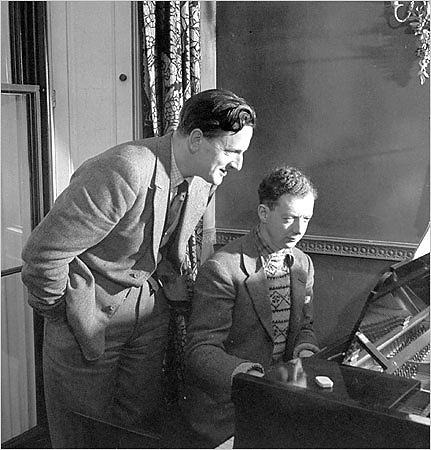
Britten (seated) and Peter Pears
In early 1939, Britten and Pears followed Auden to America. There, in 1940, Britten composed Seven Sonnets of Michelangelo, the first of many song cycles for Pears. Already friends with the composer Aaron Copland, Britten encountered his latest works Billy the Kid and An Outdoor Overture, both of which manifestly influenced his own music. While in America Britten wrote his first music drama, Paul Bunyan, an operetta (to a libretto by Auden). The period in America was also remarkable for a number of orchestral works, including the Violin Concerto Op. 15, and Sinfonia da Requiem Op. 20 (for full orchestra).
Britten and Pears returned to England in 1942, and both applied for recognition as conscientious objectors. He completed the choral works Hymn to St. Cecilia (his last large-scale collaboration with Auden) and A Ceremony of Carols during the long sea voyage. He had already begun work on his opera Peter Grimes based on the writings of Suffolk poet George Crabbe, and its première at Sadler's Wells in 1945 was his greatest success thus far.
Peter Grimes was the first in a series of English operas, of which Billy Budd (1951) and The Turn of the Screw (1954) were particularly admired. His Shakespeare opera, A Midsummer Night's Dream, followed in 1960. These operas share common themes. Even in his comic opera Albert Herring of 1947, all feature an 'outsider' character excluded or misunderstood by society. Often this is the eponymous protagonist, as in Peter Grimes and Owen Wingrave.
In his last decade, Britten's health deteriorated,and his later works became more and more sparse in texture. They include the operas Owen Wingrave (1970) and Death in Venice (1971-1973) Having previously declined a knighthood, Britten accepted a life peerage on 2 July 1976 as Baron Britten, of Aldeburgh in the County of Suffolk. A few months later he died of heart failure at his house in Aldeburgh. He is buried in the churchyard of St. Peter and St. Paul's Church there. The grave of his partner, Sir Peter Pears, lies next to his. A memorial stone to him was unveiled in the north choir aisle of Westminster Abbey in 1978.

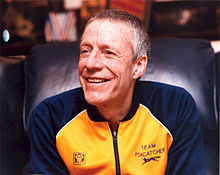
1938 – John Eleuthère du Pont (d.2010) was an American philanthropist and heir to the Du Pont family fortune who in 1996 murdered Olympic gold medal winning wrestler Dave Schultz. He was a published ornithologist, philatelist, philanthropist, conchologist, sports enthusiast, and self-styled wrestling coach. In 1972 du Pont founded and directed the Delaware Museum of Natural History and contributed to Villanova University and other institutions.
After his mother's death, du Pont developed the 440-acre (1.8 km2) Liseter Hall Farm in Newtown Square as a high-quality wrestling facility for amateur wrestlers. He called the private group "Team Foxcatcher", after his father's noted racing stable. Du Pont established an Olympic swimming and wrestling training center and sponsored competitive events at the estate. He also allowed some people, such as Olympic champion wrestlers Mark Schultz and later his older brother David Schultz and his wife, to live in houses on the grounds for years. Schultz also coached the Foxcatcher team.
In August 1988, a problem-plagued wrestling program he funded at Villanova was shut down after just two years. In December 1988, a lawsuit (which was settled out of court) claimed du Pont had made improper sexual advances to Villanova assistant coach Andre Metzger.
Du Pont became a sponsor in wrestling, swimming, track, and the modern pentathlon. He was also involved in promoting a subset of the modern pentathlon (run, swim, shoot) as a separate event. He took up athletics and became a competitive wrestler in his 50s. His only prior wrestling experience was as a freshman in high school. He began competing again at the age of 55 in the 1992 Veteran's World Championships in Cali, Colombia; following that in 1993 in Toronto, Ontario; in 1994 in Rome, Italy; and in 1995 in Sofia, Bulgaria.In the 1990s, friends and acquaintances were concerned about his erratic and paranoid behavior, but his wealth shielded him. On January 26, 1996, du Pont shot and killed Dave Schultz in the driveway of Schultz's home on du Pont's 800-acre (3.2 km2) estate. Schultz's wife Nancy and du Pont's head of security Patrick Goodale were present and witnessed the crime. The security chief was sitting in the passenger seat of du Pont's car when du Pont fired three bullets into Schultz. Police did not establish a motive. Schultz had worked with du Pont to coach the wrestling team for years. Schultz had also tried to help du Pont with his drinking problem. On February 25, 1997, he was convicted of murder in the third degree for the January 26, 1996, shooting death of Dave Schultz. He was ruled to have been mentally ill but not insane and was sentenced to prison for 13 to 30 years. He died in prison at age 72 on December 9, 2010. He was the only member of the Forbes 400 richest Americans ever to be convicted of murder.
Du Pont is the subject of the 2014 film Foxcatcher, in which he is portrayed by Steve Carell.


1943 – Billie Jean King is a former professional tennis player from the United States. She won 12 Grand Slam singles titles, 16 Grand Slam women's doubles titles, and 11 Grand Slam mixed doubles titles. King has been an advocate against sexism in sports and society. She won "The Battle of the Sexes" in 1973, in which she defeated Bobby Riggs, a former Wimbledon men's singles champion, for $100,000, winner take all.
Billie Jean Moffit was born in Long Beach, California, into a conservative Methodist family, the daughter of a fireman father and housewife mother. Billie Jean attended Long Beach Polytechnic High School. After graduating, she attended California State University, Los Angeles (CSULA) because her parents could not afford Stanford or the University of Southern California (USC).
She married Lawrence (Larry) King in Long Beach, California on September 17, 1965. In 1971, she had an abortion, which Mr. King revealed to the public in a 1972 Ms. Magazine article, without consulting Mrs. King in advance. King said in her 1982 autobiography that she decided to have an abortion because she believed her marriage was not solid enough to bring a child into her family. Billie Jean and Lawrence divorced in 1987.
By 1968, King realized that she was interested in women, and in 1971, the same year of the abortion and while still married to Lawrence King, she began an intimate relationship with her secretary, Marilyn Barnett. King was forced to acknowledge the relationship when it became public in a May 1981 "palimony" lawsuit filed by Barnett, making King the first prominent professional female athlete to come out as a lesbian. King said that she had wanted to retire from competitive tennis in 1981 but could not afford to because of the lawsuit.
"Within 24 hours [of the lawsuit being filed], I lost all my endorsements; I lost everything. I lost $2 million at least, because I had longtime contracts. I had to play just to pay for the lawyers. In three months I went through $500,000 [$1,207,416 today]. I was in shock. I didn't make $2 million in my lifetime, so it's all relative to what you make." King said in 1998 that Martina Navratilova was not supportive when King was outed, resulting in their relationship having a "very bad five years."
Speaking about the lawsuit in 2007, 26 years after it was filed, King said:
It was very hard on me because I was outed and I think you have to do it in your own time. Fifty per cent of gay people know who they are by the age of 13. I was in the other 50%. I would never have married Larry if I'd known. I would never have done that to him. I was totally in love with Larry when I was 21.
Concerning the personal cost of concealing her sexuality for so many years, King said:
I wanted to tell the truth but my parents were homophobic and I was in the closet. As well as that, I had people tell me that if I talked about what I was going through, it would be the end of the women's tour. I couldn't get a closet deep enough. I've got a homophobic family, a tour that will die if I come out, the world is homophobic and, yeah, I was homophobic. If you speak with gays, bisexuals, lesbians and transgenders, you will find a lot of homophobia because of the way we all grew up. One of my big goals was always to be honest with my parents and I couldn't be for a long time. I tried to bring up the subject but felt I couldn't. My mother would say, "We're not talking about things like that", and I was pretty easily stopped because I was reluctant anyway. I ended up with an eating disorder that came from trying to numb myself from my feelings. I needed to surrender far sooner than I did. At the age of 51, I was finally able to talk about it properly with my parents and no longer did I have to measure my words with them. That was a turning point for me as it meant I didn't have regrets any more.
On August 12, 2009, she was awarded the Presidential Medal of Freedom by President Barack Obama for her work advocating for the rights of women and the lesbian, gay, bisexual, and transgendered community. "This is a chance for me - and for the United States of America - to say thank you to some of the finest citizens of this country and of all countries", President Obama said.
King currently resides in New York and Chicago with her partner, Ilana Kloss.


1964 – Stephen Geoffreys is an American actor. Born Stephen Miller in Cincinnati, Ohio, Geoffreys first began acting on the stage. In 1984, he was nominated for Broadway's Tony Award for "Best Performance by a Featured Actor in a Musical" for his performance in a play based on the The Human Comedy. For this role, he won the Theatre World Award in 1984.
Geoffreys appeared in several horror and teen films in the 1980s, most notably Heaven Help Us (1985) as well as Fraternity Vacation and 976-EVIL in 1989. He also played a supporting part in the critically acclaimed drama At Close Range in 1986. He is best known for playing the creepy "Evil Ed" in the 1985 vampire horror classic Fright Night starring Roddy McDowall. Two of Geoffrey's lines from that film became catch phrases in the mid 1980s: "To what do I owe this dubious pleasure?" and "You're so cool, Brewster!" Some have suggested that Geoffrey's refusal to appear in the Fright Night sequel was a major career misstep.
During the 1990s, Geoffreys appeared for several years in gay pornographic movies, using the aliases Sam Ritter and Stephan Bordeaux, moving from "bloodsucker to cocksucker" as one crtic put it.

Geoffreys returned to horror in a supporting role as "Mr. Putski" in the independent film Sick Girl, released in October 2007, after an almost 17 year absence from mainstream film. He went on to play a lead role in the horror film New Terminal Hotel. He later filmed the horror movie "Emerging Past", which also featured actor Brooke McCarter of The Lost Boys fame. Geoffreys' partner is John Wiliams.


1993 – Dolly Parton denied rumors that she's a lesbian, saying gal pal Judy Ogle was just her best friend.

2008 – On this date the parliament of Burundi, one of the ten poorest countries in the world, and one of the smallest (at only 11,000 square miles--about the size of Belgium) unanimously voted to outlaw homosexuality. The irony here is that on the very same date the parliament also adopted a new set of laws abolishing the death penalty for the first time in the troubled nation's history. The sweeping law was seen as an important reform. It incorporated parts of international law on genocide, war crimes and crimes against humanity. It includes important safeguards against torture as well as sexual violence against women and children. But the new laws also criminalize homosexuality.

Today's Gay Wisdom:
Quotes from André Gide:
"Fish die belly-upward and rise to the surface; it is their way of falling."
"One does not discover new lands without consenting to lose sight of the shore for a very long time."
"It is better to be hated for what you are than to be loved for something you are not."
"Believe those who are seeking the truth. Doubt those who find it."
"Everything that needs to be said has already been said. But since no one was listening, everything must be said again."
It is easier to lead men to combat, stirring up their passion, than to restrain them and direct them toward the patient labors of peace.
It is only in adventure that some people succeed in knowing themselves - in finding themselves.
Know thyself. A maxim as pernicious as it is ugly. Whoever studies himself arrest his own development. A caterpillar who seeks to know himself would never become a butterfly.
Nothing prevents happiness like the memory of happiness.
The most important things to say are those which often I did not think necessary for me to say - because they were too obvious.
There are very few monsters who warrant the fear we have of them.


16 notes
·
View notes
Text
Malleable
Dictionaries define malleable, as : That can be reduced into sheets by hammering or passing through a rolling mill, gold, steel, etc.
This self-portrait titled "malleable man" judiciously offers the shimmering colors of the laminated steel that the light iridescent in this superb black background…

Malleable, it is also a flexible, easily influenced character.
In his Journal, 1932, André Gide gives this definition :
Human beings are so malleable that they quickly become what we convince them they already are…
2 notes
·
View notes
Text
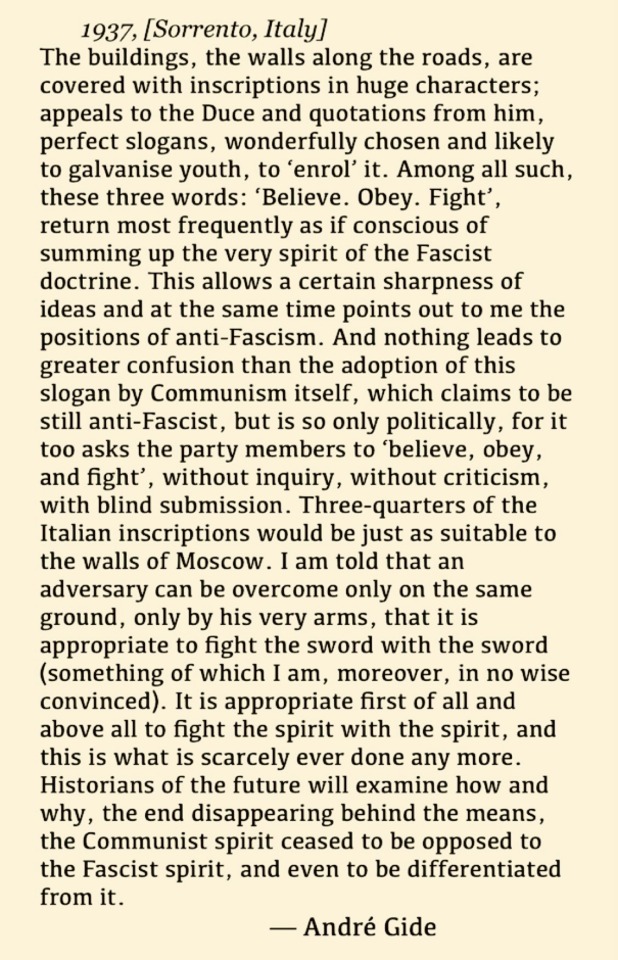
5th August.
from The Journals of André Gide: Vol. III 1928-39
4 notes
·
View notes
Quote
Mieux vaut être haï pour ce que l'on est, qu'aimé pour ce que l'on n'est pas.
André Gide
Journal (1889-1939)
#quote#quotes#Citations#citations françaises#citation#Citation française#citation en français#French quotes#french quote#french tumblr#french citation#french citations#tumblr quotes#Tumblr Quote#tumblr français#tumblr citation#tumblr citations
41 notes
·
View notes
Text
Sylvia Beach (1887-1962)
A writer, publisher and the owner of the prominent Shakespeare and company bookstore in Paris (yes, the pictures of which you have probably seen on pinterest).
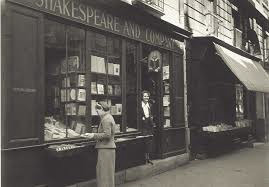
She was an American-born bookseller and publisher who lived most of her life in Paris, where she was one of the leading expatriate figures between World War I and II.
Sylvia was born in United Stated but in 1901 her family moved to Paris. Her father’s name was Sylvester Beach and that might be why she changed her birthname (Nancy) to Sylvia later so that she could be Sylvia Beach.
While conducting research at the Bibliothèque Nationale, in a French literary journal Beach read of a lending library and bookshop, La Maison des Amis des Livres. When she came there, she met an owner who turned out to be a young woman Adrienne Monnier. The two later became lovers and lived together for 36 years.
Beach started dreaming of her own book shop , so with Monnier's help, Beach opened an English language bookstore and lending library that she named Shakespeare and Company.
Shakespeare and Company quickly attracted both French and American readers, including aspiring writers to whom Beach offered hospitality and encouragement as well as books.
In July 1920, Beach met the writer James Joyce at a dinner party. Soon after, Joyce joined Beach's lending library. Joyce had been trying, unsuccessfully, to publish his manuscript for his masterpiece, Ulysses, and Beach, seeing his frustration, offered to publish it.
Shakespeare and Company gained considerable fame after it published Ulysses in 1922.
Beach would later be financially stranded when Joyce signed on with another publisher, leaving Beach in debt after she had bankrolled, and suffered severe losses from, the publication of Ulysses.
Shakespeare and Company experienced financial difficulty throughout the Great Depression of the 1930s but remained supported by wealthy friends, including Bryher.
In 1936 when Beach thought that she would be forced to close her shop, André Gide organized a group of writers into a club called Friends of Shakespeare and Company. Subscribers paid 200 francs a year to attend readings at Shakespeare and Company.
Beach later recalled "we were so glorious with all these famous writers and all the press we received that we began to do very well in business".
In 1956, Beach wrote Shakespeare and Company, a memoir of the inter-war years that details the cultural life of Paris at the time. The book contains first-hand observations of James Joyce, D. H. Lawrence, Ernest Hemingway, Gertrude Stein, Stephen Benet and many others.
After Monnier's (her lover) suicide in 1955, Beach had a relationship with Camilla Steinbrugge.Although Beach's income was modest during the last years of her life, she was widely honored for her publication of Ulysses and her support of aspiring writers during the 1920s. Beach died in 1962.
George Whitman (her friend) opened a new bookshop in 1951 at a different location in Paris (in the rue de la Bûcherie) originally called Le Mistral, but renamed Shakespeare and Company in 1964 in honor of Sylvia Beach. Since his death in 2011, it has been run by his daughter Sylvia Whitman (who was named after Sylvia Beach).


19 notes
·
View notes
Text
for my purposes, the referenced texts E.M. Forster made in his book, The Aspects of the Novel.
William George Clark. Gazpacho: Or Summer Months in Spain.
—. Peloponnesus: Notes of Study and Travel.
—. The Works of William Shakespeare - Cambridge Edition.
—. The Present Dangers of the Church of England.
John Bunyan. The Pilgrim's Progress.
Walter Pater. Marius the Epicurean.
Edward John Trelawny. Adventures of a Younger Son.
Daniel Defoe. A Journal of the Plague Year.
—. Robinson Crusoe.
—. Moll Flanders.
Max Beerbohm. Zuleika Dobson.
Samuel Johnson. The History of Rasselas, Prince of Abissinia.
James Joyce. Ulysses.
—. A Portrait of the Artist as a Young Man.
William Henry Hudson. Green Mansions.
Herman Melville. Moby Dick.
—. "Billy Budd".
Elizabeth Gaskell. Cranford (followed by My Lady Ludlow, and Mr. Harrison's Confessions).
Charlotte Brontë. Jane Eyre.
—. Shirley.
—. Villette.
Sir Walter Scott. The Heart of Midlothian (part of the Waverley Novels).
—. The Antiquary (part of the Waverley Novels).
—. The Bride of Lammermoor (part of the Waverley Novels).
George Meredith. The Ordeal of Richard Feverel.
—. The Egoist.
—. Evan Harrington.
—. The Adventures of Harry Richmond.
—. Beauchamp's Career.
Leo Tolstoy. War and Peace.
Fyodor Dostoevsky. The Brothers Karamazov.
William Shakespeare. King Lear.
Henry Fielding. The History of Tom Jones, a Foundling.
—. Joseph Andrews.
Henry De Vere Stacpoole. The Blue Lagoon (part of a trilogy; followed by The Garden of God and The Gates of Morning).
Clayton Meeker Hamilton. Materials and Methods of Fiction.
George Eliot. The Mill on the Floss.
—. Adam Bede.
Robert Louis Stevenson. The Master of Ballantrae.
Edward Bulwer-Lytton. The Last Days of Pompeii.
Charles Dickens. Great Expectations.
—. Our Mutual Friend.
—. Bleak House.
Laurence Stern. The Life and Opinions of Tristram Shandy, Gentleman.
Virginia Woolf. To the Lighthouse.
T. S. Eliot. The Sacred Wood.
One Thousand and One Nights.
Emily Brontë. Wuthering Heights.
Charles Percy Sanger. The Structure of Wuthering Heights.
Johan David Wyss. The Swiss Family Robinson.
D. H. Lawrence. Women in Love.
Arnold Bennett. The Old Wives' Tale.
Anthony Trollope. The Last Chronicle of Barset.
Jane Austen. Emma.
—. Mansfield Park.
—. Persuasion.
H. G. Wells. Tono-Bungay.
—. Boon.
Gustave Flaubert. Madame Bovary.
Percy Lubbock. The Craft of Fiction.
—. Roman Pictures.
André Gide. The Counterfeiters.
Homer. Odyssey.
Thomas Hardy. The Return of the Native.
—. The Dynasts.
—. Jude the Obscure.
Anton Chekhov. The Cherry Orchard.
Oliver Goldsmith. The Vicar of Wakefield.
David Garnett. Lady Into Fox.
Alexander Pope. The Rape of the Lock.
Norman Matson. Flecker's Magic.
Samuel Richardson. Pamela; or, Virtue Rewarded.
Anatole France. Thaïs.
Henry James. The Ambassadors.
—. The Spoils of Poynton.
—. Portrait of a Lady.
—. What Maisie Knew.
—. The Wings of the Dove.
Jean Racine. Plays.
I. A. Richards.
8 notes
·
View notes
Text
Andre gide counterfeiters pdf
ANDRE GIDE COUNTERFEITERS PDF >> Telecharger
vk.cc/c7jKeU
ANDRE GIDE COUNTERFEITERS PDF >> Lire en ligne
bit.do/fSmfG
andre gide: journals
andré gide bibliography
andré gide poems
andre gide quotesbest andré gide books
andré gide pdf
andre gide madeleine
Note : Les citations sont tirées du roman ou de l'autre oeuvre au programme, Journal des faux-monnayeurs J.FM. Download Free PDF View PDF. Buy article PDF →. Cite this: Ideas on the novel and its realization in André Gide's Les faux-monnayeurs The counterfeiters = (les faux-monnayeurs).Throughout his literary career, Andre Gide was concerned with the problem of counterfeit existence, the blind acceptance of conven-.
https://www.tumblr.com/hugedunib/697212980949057536/40ans-mode-demploi-de-lipad, https://www.tumblr.com/hugedunib/697215411604815872/jext-300-mode-demploi-thermomix, https://www.tumblr.com/hugedunib/697212980949057536/40ans-mode-demploi-de-lipad, https://www.tumblr.com/hugedunib/697214090368761856/pic16c554-pdf-editor, https://www.tumblr.com/hugedunib/697215270402572288/offre-demploi-afribaba-2018.
0 notes
Text
Devoir de Contrôle 1 Français 3ème Math

Texte : VOYAGE AU CONGO
Bangassou, 8 octobre.
Je n'ai pu trouver le temps de rien noter ces derniers jours. Le pays a changé d'aspect. De très étranges mamelons mouvementent la plaine; sortes de collines basses, régulièrement
arrondies, dômes que M. Bouvet nous dit formés par d'anciennes termitières*. Et je ne vois point quelle autre explication donner à ces soulèvements du sol. Mais ce qui me surprend, c'est de ne voir dans toute la contrée aucune termitière monumentale récente; celles, immenses, dont ont pu se former ces tumulus*, doivent, désertées depuis longtemps, vraisemblablement être vieilles de plusieurs siècles; l'action des pluies n'a pu que très lentement désagréger ces sortes de châteaux forts ou de cathédrales aux murs quasi verticaux et durs comme de la brique, que j'admirais dans la forêt des environs d'Eala. Ou bien est-ce là l'œuvre de termites d'une race différente? Et ces termitières ont-elles été de tout temps arrondies? Toutes, pourtant, semblent déshabitées depuis longtemps. Pourquoi? Il semble qu'une autre race de termites à petites constructions soit ici venue occuper le sol à la place des termites monumentaux. (...)
Tout le long de la route, sur un parcours de cinquante kilomètres, suite presque ininterrompue de villages et de cultures des plus variées: céaras, riz, mil, maïs, ricin, manioc, coton, sésame, café, taro (grand arum aux rhizomes comestibles), palmiers à huile et bananiers. Des deux côtés bordée de citronnelles, la route semble une allée de parc. Et, cachée à demi dans le feuillage, tous les trente mètres environ, une hutte de roseaux en forme de casque à pointe. Ces cités- jardins, étalées le long de la route, forment un décor sans épaisseur. La race qui, les habite et les surpeuple n'est pas très belle ; soumise depuis deux ans seulement, elle vivait éparse dans la brousse; les vieux demeurent farouches; accroupis à la manière des macaques, c'est à peine s'ils regardent passer la voiture; l'on n'obtient d'eux aucun salut. Par contre les femmes accourent, secouant et brinquebalant leurs balloches(…)
Le 6 nous avons couché à vingt kilomètres de Mobaye, où nous préférions ne pas arriver à la nuit. Devant le gîte d'étape de Moussareu, ahurissant* tam-tam; d'abord à la clarté de photophores, tenus à bras tendus par nos boys; puis au clair de la pleine lune. D'admirables chants alternés rythment, soutiennent et tempèrent l'enthousiasme et la frénésie* du pandémonium. Je n'ai rien vu de plus déconcertant, de plus sauvage. Une sorte de symphonie s'organise; chœur d'enfants et soliste; la fin de chaque phrase du soliste se fond dans la reprise du chœur. Hélas! Notre temps est compté. Nous devrons repartir avant le jour.
Le 7, au petit matin, nous ne quittons ce poste qu'avec l'espoir d'y revenir dans quelques mois, à notre retour d'Archambault. L'aube argentée se mêle au clair de lune. Le pays devient accidenté; collines rocheuses de cent à cent cinquante mètres de haut, que contourne la route. Nous arrivons à Mobaye vers dix heures.
André Gide, Voyage au Congo, dans Journal, souvenirs (1939-1949), Bibliothèque de la Pléiade, 1960, pp.720-723.
Lexique :
Termitières : Nids d’insectes (appelés termites) construits en terre ou en carton de bois. Tumulus : Grand amas de pierres élevé au dessus d’une construction préhistorique.
Frénésie : Délire intense / extase / joie /
Lycée Bourguiba
Monastir
DEVOIR DE CONTRôLE N°1
Nom et Prénom :……………………….
……………………………Classe : ……….
A- Compréhension : (6points)
- Au début de sa visite à Bangassou, le narrateur fut Qu’est-ce qui a provoqué sa surprise ? (1pt)
………………………………………………………………………………………………………………………………………………………………..
…………………………………………………………………………………………………………………………………………………………………
…………………………………………………………………………………………………………………………………………………………………
- a- Par quoi s’expliquent les variations de cultures qu’il a constatées dans son parcours au Congo? (1pt)
……….………………………………………………………………………………………………………………………………………………………..
…………………………………………………………………………………………………………………………………………………………………
………………………………………………………………………….
b-Trouvez deux indices textuels qui le montrent. (1pt)
…………………………………………………………………………………………………………………………………………………………………
…………………………………………………………………………………………………………………………………………………………………
- a- Quel effet, ce voyage avait-il sur le narrateur ? (1.5pts)
…………………………………………………………………………………………………………………………………………………………………
………………………………………………………………………………………………………………………………………………………………..
………………………………………………………………………………………………………………………………………………………………..
b- Relevez et expliquez un procédé d’écriture qui met en valeur cet effet. (1.5pts)
…………………………………………………………………………………………………………………………………………………………………
…………………………………………………………………………………………………………………………………………………………………
…………………………………………………………………………………………………………………………………………………………………
……………………………………………………………….
B- Langue : (4 points)
1) Relevez quatre noms de régions visitées par le narrateur dans ce texte. (1pt)
*…………………………………… *……………………………………. *………………………………… *…………………………………….. 2)* L’absence des termitières monumentales est due à l’arrivée de certaines races différentes. a/Identifiez le rapport logique exprimé dans cette phrase. (0.5) àà ……………………………………………………
b/Réécrivez la phrase en utilisant : « être à l’origine de » (0.5) àà ……………………………………………………..
………………………………………………………………………………………………………………………………………………………………
c/Utilisez un procédé grammatical pour exprimer le même rapport logique dans une phrase complexe (1)
…………………………………………………………………………………………………………………………………………………………………
………………………………………………………………………………………………………………………………………………………………..
3) Utilisez les informations suivantes pour rédiger un paragraphe où vous emploierez les expressions de but, de cause et de conséquence expliquant les projets de la compagnie « SNCFT » (2pts)
*Réclamations nombreuses des voyageurs *Améliorer la qualité du service *Nouvelles lignes
*Attirer plus de clientèle *Recruter d’autres conducteurs de train et de métro
………………………………………………………………………………………………………………………………………………………………..
………………………………………………………………………………………………………………………………………………………………..
…………………………………………………………………………………………………………………………………………………………………
…………………………………………………………………………………………………………………………………………………………………
C- Essai : (10 points)
Certains affirment que « le voyage organisé » est la meilleure façon de profiter de ses vacances. Partagez-vous leur opinion ?
Exprimez votre point de vue dans un paragraphe cohérent.
…………………………………………………………………………………………………………………………………………………………………
Read the full article
0 notes
Text
Je me souviens des jours de ma jeunesse où le bonheur habitait mon cœur comme un dieu.
André Gide - Journal
14 notes
·
View notes
Photo
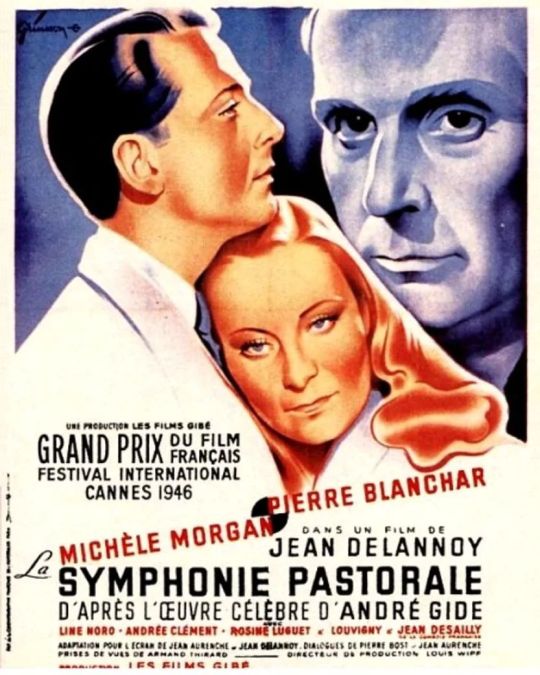
THÈME DE "LA LITTÉRATURE CLASSIQUE EN BREF" #culturejaiflash LA SYMPHONIE PASTORALE André Gide (1869-1951) est un écrivain français issu d'une famille bourgeoise protestante. Considéré comme un écrivain majeur du XXe siècle, il est lauréat du prix Nobel en 1947 pour ce livre. André Gide vivait près de Cambremer dans le Pays d'Auge, non loin où j'ai grandi. La Symphonie pastorale est un roman court écrit par André Gide entre février et novembre 1918 puis publié en 1919, qui traite du conflit entre la morale religieuse et les sentiments. Regardez "Beethoven : Symphonie n°6 "Pastorale" sous la direction de Daniele Gatti" sur YouTube https://youtu.be/6yc7W-OhD04 RÉSUMÉ DU ROMAN Dans les années 1890, Gertrude, une jeune fille aveugle et orpheline de sa tante qui vient de mourir, est recueillie par un pasteur qui lui propose de vivre avec sa femme, Amélie, et ses cinq enfants dans une petite chaumière du Jura neuchâtelois, en Suisse. Dans son journal, le pasteur raconte l’éducation protestante qu’il donne à Gertrude, dont il finit par tomber amoureux. Son fils Jacques tombe également amoureux de Gertrude. Lorsque le pasteur s’en rend compte, il lui ordonne de partir. Une opération donne la vue à Gertrude et, voyant le père et le fils, elle tombe amoureuse de Jacques plutôt que du pasteur, même si, encore aveugle, elle avait davantage de sentiments amoureux pour ce dernier. Entre-temps, Jacques s'est converti au catholicisme, rejetant ainsi définitivement son père pasteur, et a pris l'habit de moine. Il renonce donc également à ses sentiments pour Gertrude. La vue permet à Gertrude d’observer tout ce que le pasteur lui avait caché, le mal et le péché, durant des années pour protéger le sentiment de bonheur qu’il avait tenté de susciter chez elle. Attristée par ses découvertes, et par le fait qu'elle prend une place importante dans la famille, après une tentative de suicide au cours de laquelle elle s’est presque noyée, Gertrude finit par mourir d'une pneumonie quelques semaines après l’opération qui lui a permis de voir. https://www.facebook.com/groups/2633342570072743/?ref=share_group_link https://www.instagram.com/p/Ch4RLSWsnZM/?igshid=NGJjMDIxMWI=
0 notes
Text
Saturday, 07/02/2022 part two
Journaling is supposed to help my recoveries, so here we go.


I learned about this today:
https://en.m.wikipedia.org/wiki/Ethyl_Corporation
I also changed my wallpaper and lockscreen tonight.


Let's read my favorite book.
"It's one of my theories that when people give you advice, they're really just talking to themselves in the past." — Austin Kleon
This blog is me giving advice to myself in the future.
"Everything that needs to be said has already been said. But, since no one was listening, everything must be said again." — André Gide (жид)
"You don't get to pick your family, but you can pick the music you listen to and you can pick the books you read and you can pick the movies you see. You are, in fact, a mashup of what you choose to let into your life." — Austin Kleon
"We are shaped and fashioned by what we love." — Goethe
"Steal from anywhere that resonates with inspiration or fuels your. imagination. Devour old films, new films, music, books, paintings, photographs, poems, dreams, random conversations, architecture, bridges, street signs, trees, clouds, bodies of water, light and shadows. Select only things to steal from that speak directly to your soul. If you do this, your work will be authentic." — Jim Jarmusch
"Chew on one thinker--writer, artist, activist, role model-you really love. Study everything there is to know about that thinker. Then find three people that thinker loved, and find out everything about them. Repeat this as many times as you can. Climb up the tree as far as you can go. Once you build your tree, it's time to start your own branch." — Austin Kleon
"Whether you're in school or not, it's always your job to get yourself an education." — Austin Kleon
"It's not the book you start with, it's the book that book leads you to... Collect books, even if you don't plan on reading them right away. Nothing is more important than an unread library." — Austin Kleon
"Carry a notebook and a pen with you wherever you go. Get used to pulling it out and jotting down your thoughts and observations. Copy your favorite passages out of books. Record overheard conversations. Doodle when you're on the phone." — Austin Kleon
I've wanted to do this for years and never knew how to start. How does one bring a notebook wherever they go? How does one find the time in the moment to stop and record? Sure, it can be messy and it doesn't have to be in-depth, but most of my inspiration and things I long to record occur while I'm at work. Who stops on the job to write things down? How does one gain that freedom?
"Keep a swipe file. It's just what it sounds like—a file to keep track of the stuff you've swiped from others... See something worth stealing? Put it in the swipe file. Need a little inspiration? Open up the swipe file. Newspaper reporters call this a "morgue file"- I like that name even better. Your morgue file is where you keep the dead things that you'll later reanimate in your work." — Austin Kleon
"Do you ever have moments of imposter syndrome?" "I almost asked what you think of 'fake it 'til you make it,' but I thought this was more intriguing."
"In the beginning, we learn by pretending to be our heroes. We learn by copying... Who to copy is easy. You copy your heroes—the people you love, the people you're inspired by, the people you want to be... What to copy is a little bit trickier. Don't just steal the style, steal the thinking behind the style. You don't want to look like your heroes, you want to see like your heroes." — Austin Kleon
I've unintentionally adopted this habit in my life.

"Bradford Cox, a member of the band Deerhunter, says that... he had to wait until the official release day to hear his favorite band's new album. He had a game he would play: He would sit down and record a "fake" version of what he wanted the new album to sound like. Then, when the album came out, he would compare the songs he'd written with the songs on the real album." — Austin Kleon
"Just watch someone at their computer. They're so still, so immobile... We need to move, to feel like we're making something with our bodies, not just our heads... You need to find a way to bring your body into your work... if we strum a guitar, or shuffle sticky notes around a conference table, or start kneading clay, the motion kickstarts our brain into thinking." — Austin Kleon
"I have stared long enough at the glowing flat rectangles of computer screens. Let us give more time for doing things in the real world... plant a plant, walk the dogs, read a real book, go to the opera." — Edward Tufte
"When I was making the poems, it didn't feel like work. It felt like play." — Austin Kleon
Never work a day in your life. Find something that fulfills you. Insert your meraki into it. Indulge your passions and show the world what you're made of, and show them what makes you.
"Stand up while you're working. Pin things on the walls and look for patterns. Spread things around your space and sort through them." — Austin Kleon
"The work you do while you procrastinate is probably the work you should be doing for the rest of your life." — Jessica Hische
"'When I get busy, I get stupid.' Ain't that the truth. Creative people need time to just sit around and do nothing... Take a really long walk. Stare at a spot on the wall for as long as you can... Take time to mess around. Get lost. Wander. You never know where it's going to lead you." — Austin Kleon
"When you love different things, you spend time with them." — ? Tomlinson
"The thing is, you can cut off a couple passions and only focus on one, but after a while, you'll start to feel phantom limb pain. I spent my teenage years obsessed with songwriting and playing in bands, but then I decided I needed to focus on just writing, so I spent half a decade hardly playing any music at all... I started playing in a band again. Now, I'm starting to feel whole." — Austin Kleon
"You're very good at recalling lyrics, stories, anecdotes, and quotes, and I, for one, really enjoy hearing them."
I'm at 83% sleep now. Goodnight
1 note
·
View note
Text
Les Temps modernes
“Les Temps Modernes (Modern Times) is a French journal, founded by Simone de Beauvoir, Jean-Paul Sartre, and Maurice Merleau-Ponty. It first issue was published in October 1945. It was named after the 1936 film by Charlie Chaplin. Les Temps Modernes filled the void left by the disappearance of the most important pre-war literary magazine, La Nouvelle Revue Française (The New French Review), considered to be André Gide's magazine, which was shut down by the authorities after the liberation of France because of its collaboration with the occupation. ...”
Wikipedia
Guardian - Les Temps Modernes: Paris mourns passing of the intellectual left’s bible
Les Temps Modernes : media and ideology in the case of Jean-Paul Sartre and Simone de Beauvoir
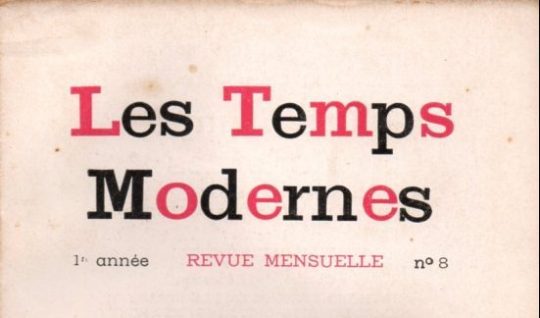
0 notes
Quote
Every time I see her again I recognize anew that I have never really loved anyone but her; and even, at times, it seems to me that I love her more than ever.
André Gide, The Journal of André Gide
1 note
·
View note